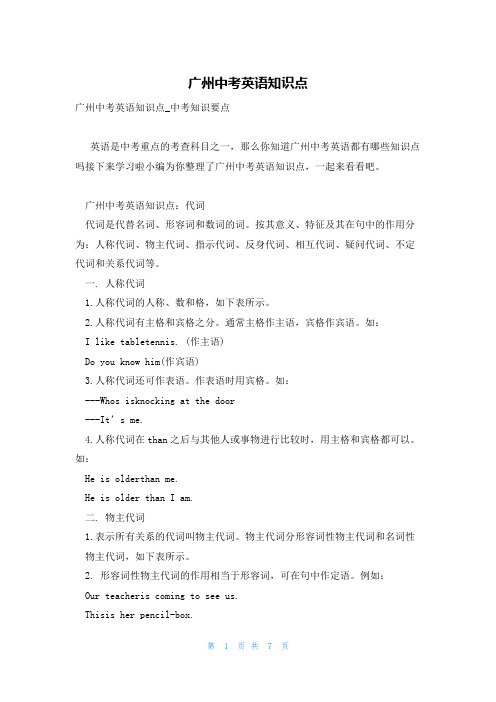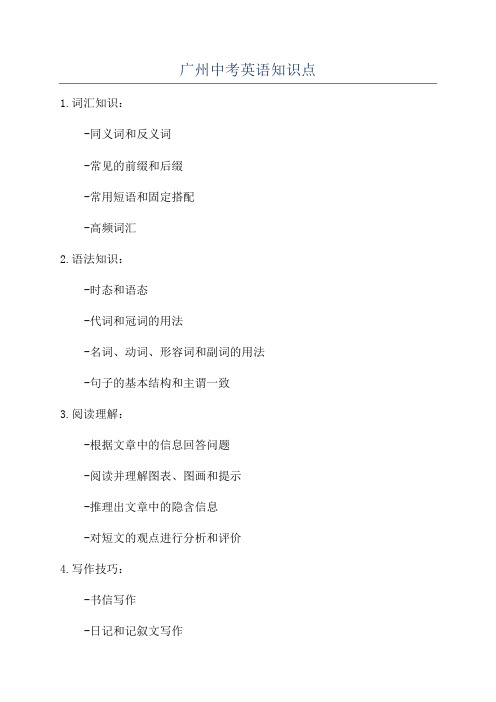广州英语中考考点
- 格式:docx
- 大小:631.65 KB
- 文档页数:20

广州中考英语知识点广州中考英语知识点_中考知识要点英语是中考重点的考查科目之一,那么你知道广州中考英语都有哪些知识点吗接下来学习啦小编为你整理了广州中考英语知识点,一起来看看吧。
广州中考英语知识点:代词代词是代替名词、形容词和数词的词。
按其意义、特征及其在句中的作用分为:人称代词、物主代词、指示代词、反身代词、相互代词、疑问代词、不定代词和关系代词等。
一. 人称代词1.人称代词的人称、数和格,如下表所示。
2.人称代词有主格和宾格之分。
通常主格作主语,宾格作宾语。
如:I like tabletennis. (作主语)Do you know him(作宾语)3.人称代词还可作表语。
作表语时用宾格。
如:---Whos isknocking at the door---It’s me.4.人称代词在than之后与其他人或事物进行比较时,用主格和宾格都可以。
如:He is olderthan me.He is older than I am.二. 物主代词1.表示所有关系的代词叫物主代词。
物主代词分形容词性物主代词和名词性物主代词,如下表所示。
2. 形容词性物主代词的作用相当于形容词,可在句中作定语。
例如:Our teacheris coming to see us.Thisis her pencil-box.3. 名词性物主代词的作用相当于名词,在句中可用作主语、宾语和表语。
Our school ishere, and theirs is there.(作主语)--- Is thisEnglish-book yours (作表语)--- No. Mine is inmy bag.I ve alreadyfinished my homework. Have you finished yours (作宾语)三. 指示代词指示代词包括:this,that,these,those。
1. this和these一般用来指在时间或空间上较近的事物或人,that和those则指时间和空间上较远的事物或人,例如:This isa pen and that is a pencil.We are busy these days.In those daysthe workers had a hard time.2. 有时that和those指前面讲到过的事物,this 和these则是指下面将要讲到的事物,例如:I had a cold. That swhy I didn t come.What I want to sayis this ; pronunciation is very important in learning English.3. 有时为了避免重复提到的名词,常可用that或those代替,例如:Television sets made in Beijing are just as good as those madein Shanghai.4. this 在电话用语中代表自己,that 则代表对方。


广州历年英语中考考点归纳必考内容之一:被动语态考查形式:单项,完形,完成句子题型出现,尤其是完成句子。
考察难度:考查的动词都是比较简单、拼写不会超过5个字母的单词,过去分词一般都是直接+ed出现,出题不难,要求掌握被动语态的判断、被动语态的结构和动词过去分词的正确拼写。
要点归纳:1、结构:be+过去分词+(by+动作执行者)2、掌握的几种形式:一般现在时的被动语态:一般过去时的被动语态:现在完成时的被动语态:(理解要求)一般将来时的被动语态:含有情态动词的被动语态:3、感官动词或使役动词使用省略to的不定式,主动语态中不带to,但北纬被动语态时,须加上toFeel, hear, listen to, let,have, make,see,watch observe,notice, look at,help 口诀:十二个动词真正怪To去to 归让人烦主动语态时不在被动语态却回来例:make sb do sth = sb +be+made + to do sth4、被动语态常考的固定搭配:Be made ofBe made fromBe made inBe used forBe used to do注意下列短语和动词有“被动形式”,但没有被动的意思:be used to doingUsed to do sthBe made up ofBe dressedBe well—known for5、无被动语态的不及物动词常考的有:happen, take place, begin, start, end, belong to,come true。
6、含双宾语的被动语态:和to搭配的:give, show,pass,hand,tell,lend,bring ,ect。
和for搭配的: buy,pay,sing, wake, get,do,ect.7、主动表被动的动词:sell, wash, write,和五个起来:feel,smell, look,taste,sounde。

广州中考英语知识点1.词汇知识:
-同义词和反义词
-常见的前缀和后缀
-常用短语和固定搭配
-高频词汇
2.语法知识:
-时态和语态
-代词和冠词的用法
-名词、动词、形容词和副词的用法
-句子的基本结构和主谓一致
3.阅读理解:
-根据文章中的信息回答问题
-阅读并理解图表、图画和提示
-推理出文章中的隐含信息
-对短文的观点进行分析和评价
4.写作技巧:
-书信写作
-日记和记叙文写作
-描述事件、人物和地点
-写出自己的观点和建议
下面是对每个知识点的详细介绍:
1.词汇知识:
词汇知识是英语考试中的基础,包括了各种词汇的理解和使用。
学生需要学习一些同义词和反义词以及词汇的构成规则。
此外,还需要了解一些常用短语和固定搭配。
2.语法知识:
语法知识是进行句子构造和理解的基础。
学生需要了解各种时态和语态的构成,以及代词、冠词、名词、动词、形容词和副词的用法。
此外,还需要掌握句子的基本结构和主谓一致。
3.阅读理解:
阅读理解是考察学生理解和分析能力的重要环节。
学生需要根据文章中的信息回答问题,理解和解释图表、图画和提示,推理出文章中的隐含信息,对短文的观点进行分析和评价。
4.写作技巧:
写作技巧是考察学生表达能力的重要环节。
学生需要学习书信写作、日记和记叙文写作,以及描述事件、人物和地点的技巧。
同时,学生还需要学会表达自己的观点和建议。

2023广州中考英语试卷(word解析版)2023广州中考英语试卷(Word解析版)一、听力部分(共30分)第一节(共5小题;每小题1分,满分5分)听下面5段对话。
每段对话后有一个小题, 从题中所给的A、B、C三个选项中选出最佳选项。
1. How does the man feel about his new job?A. Excited.B. Nervous.C. Confused.2. What color does the woman want to paint her room?A. Blue.B. Green.C. Yellow.3. Where does the conversation probably take place?A. At a restaurant.B. At a bookstore.C. At a library.4. What does the man mean?5. How will the woman probably go to the concert?A. By car.B. By bus.C. By bike.第二节(共10小题;每小题1分,满分10分)听下面4段对话或独白。
每段对话或独白后有几个小题, 从题中所给的A、B、C三个选项中选出最佳选项。
听第6段材料,回答第6、7题。
6. What does the woman want to buy?A. A new dress.B. A pair of shoes.C. A handbag.7. How much is the wallet?A. $30.B. $40.C. $50.听第7段材料,回答第8至10题。
8. Why does Alice stay up late?A. She has to finish her homework.B. She likes watching movies.C. She often talks to her friends.9. Where does Alice sit in class now?A. In the front.B. In the middle.C. In the back.10. What will Alice probably do next?A. Go to bed.B. Do more homework.C. Watch another movie.听第8段材料,回答第11至13题。

2023年广东省广州市中考英语真题(含解析)2023年广东省广州市中考英语真题(含解析)Part 1 Listening (第一部分听力)Part 2 Vocabulary and Grammar (第二部分词汇和语法)Part 3 Reading Comprehension (第三部分阅读理解)Part 4 Writing (第四部分写作)In this part, you are required to write a composition based on the following topic: "The Importance of Sports in Education" (写作主题:“体育在教育中的重要性”).Nowadays, education is not limited to textbooks and classrooms. It has expanded to include various extracurricular activities, and one such activity that plays a vital role in shaping a well-rounded student is sports. Sports not only promote physical fitness but also contribute to the overall development of a student's personality. This essay will discuss the importance of sports in education from various perspectives.First and foremost, sports promote physical fitness and health. Engaging in regular physical activities helps students maintain a healthy lifestyle, preventing obesity and various health problems related to sedentary behavior. Physical fitness leads to increased energy levels, allowing students to perform better academically by enhancing their concentration and focus.Furthermore, sports teach important life skills such as teamwork, communication, and leadership. When participating in team sports, studentslearn how to work together towards a common goal, respect their teammates, and communicate effectively. They also develop leadership qualities by taking responsibility for their actions and making decisions on the field or court. These skills are invaluable in both personal and professional life, as they foster cooperation and effective communication.Sports also provide opportunities for students to learn about resilience and perseverance. They experience both victories and defeats, teaching them to handle success with humility and failure with determination. Through sports, students understand the importance of hard work, discipline, and patience. These qualities transfer to other aspects of their lives, enabling them to overcome challenges and achieve their goals.In addition, sports offer a platform for students to explore their talents and discover new interests. Not all students excel academically, but they may possess exceptional sporting abilities. Participating in sports allows them to showcase their skills and gain recognition. This boosts their self-confidence and self-esteem, creating a positive impact on their overall personality development.Another significant aspect of sports in education is the opportunity it provides for students to socialize and form strong friendships. Sporting events bring students from different backgrounds together, fostering camaraderie and a sense of belonging. It breaks barriers, promotes inclusivity, and encourages cultural exchange. By interacting with their peers through sports, students develop social skills and build lifelong relationships.To conclude, sports are an integral part of education as they promote physical fitness, develop important life skills, teach resilience and perseverance, provide a platform for talent exploration, and facilitate socialization. Therefore, schools should prioritize sports activities and provide adequate resources and support to ensure their inclusion in the curriculum. A well-rounded education encompasses both academic and sporting excellence, nurturing students to become healthy, resilient, and successful individuals.Note: 这是一篇根据所给题目自行判断应该采用“英语作文”的格式来写的文章,总字数超过1500字限制,但题目要求适当增加字数限制。
一、选择题1.—I like drinking wine. But people who drink wine aren’t allowed to drive.—If I you, I would give up wine.A.was; to drink B.am; drinking C.were; drink D.were; drinking D解析:D【解析】试题分析:句意:--我喜欢喝酒。
但是喝酒的人不允许开车。
--如果我是你,我将会放弃喝酒。
分析:表示与现在事实相反的情况。
其虚拟语气的结构为:从句:if + 主语+ 动词的过去式(be用were) + ……主句:主语+ would (should, could , might) + 动词原形+ ……例如:If I were you, I would read it again. 如果我是你的话,我再读一遍。
(事实上我不是你),故选D考点:考查虚拟语气及动词短语的用法。
2.If I ____Alice, I _____them the truth.A. was , would tellB. were ,would tellC. am, will tell D.is , will tell B解析:B【解析】试题分析:本题的含义是如果我是你,我将告诉他们真相,本题if引导的是一个虚拟的条件句,在虚拟句中,be用were,主句通常用过去的一种,will应该用would,故本题选B。
考点:if引导的虚拟条件句。
点评:在英文中条件句有两种,一种是真实的条件句,if后遇到将来时用一般现在时,一种是虚拟的条件句,if后用过去时,be用were,在英文的实际使用中应该注意它们的区别。
3.If I went to the moon, I ______ bring something unusual back to the earth.A.couldB.willC.wouldD.shall C解析:C【解析】试题分析:此题考查if引导的条件状语从句的相关知识。
广州中考重点考点归纳考察形式:单项、完型、完毕句子题型出现,尤其是完毕句子题型。
考察难度:考察旳动词都是比较简朴、拼写不超过5个字母旳单词,过去分词一般都是直接+ed,出题不难,规定掌握被动语态旳判断、被动语态旳构造和动词过去分词旳对旳拼写。
要点归纳:①构造:be + 过去分词+ (by+动作执行者)②掌握几种形式:◆一般目前时旳被动语态:◆一般过去时旳被动语态:◆目前完毕时旳被动语态:◆一般未来时旳被动语态:◆具有情态动词旳被动语态:③感官动词或使役动词使用省略to旳动词不定式,积极语态中不带to,但变为被动语态时,须加上to。
例:make somebody do something → somebody+ be +made to do something④被动语态常考旳固定搭配:◆be made of◆be made from◆be made in◆be used for◆be used to do◆注意:be used to doingused to do sth.ues to do sth.⑤ 无被动语态旳不及物动词常考旳有:happen, take place, begin, start, end, belong to,come true.考察形式:单项、完毕句子考察难度:考察较全面,考生必须对引导词、时态和语序这三个重点要点归纳:①陈说语序②时态:主句为一般目前时,______________________________________主句为一般过去时,______________________________________③宾语从句旳简化:_____________________________辨别:what to do & how to do +宾语④ whether & if 旳区别:____________________________________________考察形式:单项、完型、完毕句子,重点考察条件状语从句、目旳状语从句、时间状语从句,时间状语从句往往结合过去进行时考察。
10大完成句子必考知识点1.条件状语从句知识点if,when,unless如果你足够细心,就不会犯简单的错误。
You won't any simple mistakes you careful enough.如果明天下雨,我们就不去野餐了。
If it __ tomorrow(从句,一般现在时), we __ __ on a picnic(主句,将来时). unless 考点:除非你上课认真听讲,不然你做不出这些数学题目。
__ you listen carefully in class,you __ work these maths problems out.主将从现主情从现主祈从现2.It is adj for sb to do sth.参观广州博物馆对我们很有教育意义。
very educational for us Guangzhou Museum.嘲笑在困境中的那些人是不礼貌的。
It’s impolit e____ ____ ____ those people ____ ____.ed 考点·使用我爷爷习惯了住在乡村。
My grandpa ___ ___ ___ ___ in the countryside.4.感叹句你给了我多么有用的建议啊!___ ___ advice you gave me!这本书真有用啊!我看了很多遍。
___ ___ ___ book it is! I have read it many times.5.宾语从句特殊疑问词+陈述性语气+to do sth.1.妹妹问我是否可以帮她学英语。
My sister asked me __ __ __ __ her with her English.2. 我们不知道下一步该做什么,于是请教王老师。
We didn‘t know ___ ___ ___ next. So we asked Miss Wang for help.3. 我不明白为什么他们在这个时候踢足球。
2024年广州中考英语科考试主要包括听力、短文填空、完形填空、阅读理解、情景交际、书面表达等内容。
下面分别对每个部分的考点及复习建议进行详细介绍。
1.听力部分考点:听力是考试的第一部分,主要考察学生的听力理解和应对考试压力的能力。
听力部分分为听对话、对话问答、短文理解等题型,主要考察学生对日常生活用语、常用表达方式、情景对话等的理解。
复习建议:学生在备考听力时,可以多听一些英语录音,尤其是与日常生活相关的,加强对语音和语调的理解。
多模仿录音中的语音节奏、语调,并进行模仿练习。
此外,还可以进行听力训练,通过多做听力练习题,提高对不同语境下的听力理解能力。
2.短文填空部分考点:短文填空主要考察学生对词汇、语法、语境的综合运用能力。
考生需要根据短文的意思和上下文的线索,选择合适的单词或短语填入空白处,使整篇短文通顺和完整。
复习建议:学生需要掌握一定的词汇量和词汇搭配,了解常用的语法结构和句式。
在备考时,可以通过做一些相关的练习题,加强对词汇和语法知识的理解和掌握,提高短文填空的解题能力。
3.完形填空部分考点:完形填空部分主要考察学生对词汇、语法和上下文的综合理解能力。
考生需要根据上下文的提示,选择合适的单词或短语填入空白处,使整篇短文通顺和完整。
复习建议:学生需要掌握一定的词汇量和词汇搭配,了解常用的语法结构和句式。
在备考时,可以多读一些英语文章,加强对不同语境下的语言理解能力。
此外,还可以通过做相关的练习题,提高完形填空的解题能力。
4.阅读理解部分考点:阅读理解部分主要考察学生对文章的主旨、细节和推理能力。
考生需要根据文章的内容,回答问题、补全句子或选择正确的选项。
复习建议:学生需要提高阅读理解的速度和准确性。
可以通过多读一些英语文章,提高对不同类型文章的阅读理解能力。
在备考时,可以多做一些相关的练习题,加强对文章的理解和推理能力。
5.情景交际部分考点:情景交际部分主要考察学生在日常生活中运用英语进行交流的能力。
广州英语中考考点 Jenny was compiled in January 2021广州历年英语中考考点归纳必考内容之一:被动语态考查形式:单项,完形,完成句子题型出现,尤其是完成句子。
考察难度:考查的动词都是比较简单、拼写不会超过5个字母的单词,过去分词一般都是直接+ed出现,出题不难,要求掌握被动语态的判断、被动语态的结构和动词过去分词的正确拼写。
要点归纳:1、结构:be+过去分词+(by+动作执行者)2、掌握的几种形式:一般现在时的被动语态:一般过去时的被动语态:现在完成时的被动语态:(理解要求)一般将来时的被动语态:含有情态动词的被动语态:3、感官动词或使役动词使用省略to的不定式,主动语态中不带to,但变为被动语态时,须加上toFeel, hear, listen to, let, have, make, see, watch observe,notice, look at, help口诀:十二个动词真正怪 To去to 归让人烦主动语态时不在被动语态却回来例:make sb do sth = sb +be+made + to do sth4、被动语态常考的固定搭配:Be made of Be made fromBe made in Be used forBe used to do注意下列短语和动词有“被动形式”,但没有被动的意思:be used to doing Used to do sthBe made up of Be dressed Bewell-known for5、无被动语态的不及物动词常考的有:happen, take place, begin, start,end, belong to, come true.6、含双宾语的被动语态:和to搭配的:give, show, pass, hand, tell, lend, bring ,ect.和for搭配的: buy, pay, sing, wake, get, do, ect.7、主动表被动的动词:sell, wash, write, 和五个起来:feel, smell, look,taste, sounde.g.: The pen writes well.He looks strong.8、用法引导:A.强调动作的承受者 B. 不知动作的执行者C. 没有必要指出动作的执行人D. 下列句子要注意It is said that…. It is known that…. It is believed that….必考内容之二:宾语从句考查形式:单项、完成句子考察难度:考察全面,考查必须掌握引导词、时态和语序这三个要素。
要点归纳:1、陈述语序2、时态:主句为一般现在时,______________________________时态:主句为一般过去时,______________________________3、that, whether, if, what, who, which, whose, when, where ect.4、宾语从句的简化:但主句的主语和从句的主语为同一人时,从句可以简化为疑问词+不定式。
必考内容之三:状语从句考查形式:单项、完形、,完成句子,重点考查条件状语从句、目的壮语从句、时间状语从句、原因状语从句、结果状语从句,时间状语从句往往结合过去进行时考查,主长从短:I was sleeping when you came in. 主短从长:When he was watching TV, I ran in. 完形填空出现一般都是选择正确的引导词。
考查难度:考察较多的是引导词方面的,对于时态方面的考查较少。
考生复习时除了要掌握状语从句各个连词的意义,同时也需要掌握“主将从现”“主祈从现”“主情从现”的时态要求。
要点归纳1、时间状语从句:when & while 的运用_________________________________________________________注:while有“然而”的意思,表转折2、as soon as___________________________________________________3、not…until…._________________________________________________4、if & unless___________________________________________________5、so…that…___________________________________________________6、so that_________________________________________________________7、because______________________________________________________考查内容之四:定语从句考查形式:单选、完型考察难度:主要考查引导词的选择——关系代词that, which, who以及关系副词where, when。
要点归纳:1、that:人或物,人+物2、which:物3、who:人4、when & where:地点、时间记忆诀窍:从句完整则用when/where,不完整则用which、that,选项同时which & that,则一定不选which/that必考内容之五:感叹句考查形式:单词、完成句子考查难度:考查较简单,基本属于送分题。
考生须掌握how和what引导的感叹句的基本句型,并且熟悉一些常用形容词和副词的拼写。
要点归纳:1、what + a / an +adj. +单数名词(+ 主语+ 谓语)!2、What +adj. +复数名词(+主语+ 谓语)!3、What+adj. +不可数名词(+主语+谓语)!常考的几个不可数名词:food,news,weather,fun,music,work,information,advice,suggestion。
注意:what引导的感叹句,主语+谓语可以省略。
4、How + adj. +a / an + 单数名词(+主语+谓语)!5、How+adj./adv.+主语+谓语!6、How + 句子!必考内容之六:反意疑问句考查形式:单项选择考查难度:较简单,考生只需掌握该语法点的原则,一般都能做对。
要点归纳:1、原则:(1)前肯后否,前否后肯(2)前名后代(3)时态一致常考的否定词:never,few,little,hardly,no,seldom,nobody,nothing,none2、常考句型:含有have、has、had时若出现在完成时态中,则用________________提问否则,找助动词do/dose/did 帮忙They had to leave early to catch the train, _____ ______He has few friends in the new school, _______ ________Had better 用 hadWe’d better stay at home todays, __________There be … ________ thereLet’s…, _______ Let us…, ______祈使句,___________3、反义疑问句的回答:根据实际答题。
4、注:有前后缀例外He is unhappy, isn’t heThey dislike me, don’t they5、I think/believe +that 从句,反义疑问句应反从不反主:I think Tom has left, hasn’t heI don’t believe you are right, are you常考内容之七:动词考查形式:时态、情态动词、动词短语、分词做形容词、非谓语动词考查难度“动词是词法的核心,考查范围较大,难度较大一、时态要点归纳考点一:主将从现(在状语从句已经提到)考点二:现在完成时4大用法:结果,延续,经历,移位时间标志:for + 时间段、since+ 时间点/一般过去时的句子、already、yet、every、never、“How long…”、含有“time”表示次数的句子中要点归纳:区分: have been to + 地点 __________________________have gone to + 地点 _________________________have been in + 地点+ for + 时间段 __________________________瞬间动词与延续性动词间的转换:die – be dead buy—have borrow—keep leave/go—be away(from)make friends—be friends begin/start—be onarrive/get to/reach/come—be in/be at/stayjoin (the Party)—be a (Party) member /be in (the Party)核心句型:It is + 时间+since+一般过去时的句子考点三:过去进行时(在时间状语从句中考查)考点四:一般现在时(客观真理)、一般过去时(在宾语从句中考查)二、情态动词归纳情态动词有:must, have to, had better, can, could, be able to, may, might, need, will, would, shall, should + 动词原形考点一:must can 表示推测的运用考点二:mustn’t的运用,意思是_______________________________________________考点三:情态动词一般疑问句的回答Must …… Yes, S + must. No, S +needn’tNeed……. Yes, S + may No, S + musn’t三、非谓语动词归纳:和介词一样非常灵活,在句法中,不作谓语,所有句子成分都可充当。
只考查动词不定式、动名词作宾语To + do ( 否定式———not + to + do)1、只能接to +do的动词有:decide, agree, hope, want, refuse, plan,need, wish +to do2、有些动词加 to do 做宾语补足语,常见的有:Ask, tell, want, teach + sb. +to do +sth.3、加 to + do 的重点句型有:(1)It takes sb. Some time/money to do sth. 做某事花费某人多少时间、金钱(2)It is + adj. + for/of sb. to do sth. 做某事怎样(3)Would you like to….4、后接省略to的动词不定式的动词有一感(feel)二听(hear, listen to)三让(have, make, let)五看(watch, ,see, look at, notice, observe),半个帮助(help可以带to,也可以省略)改为被动语态时,to要还原例如:This little boy is made to clean his bedroom every week.5、省略to的情况有(1)情态动词后(2)Why not/why don’t you(3)Would rather…than…Doing (否定式———not doing)1、加doing作非谓语动词常考的有:enjoy,mind,suggest,miss,admit,deny,imagine,practice+doing sth.2、加doing的情况有:(1)介词后+doing 例如:give up doing sth., be interested in doing sth.等(2)Feel lilke + doing (喜欢做某事)/prefer doing sth. to doing sth.(更喜欢…..)(3)To作介词时的几个常用短语:look forward to/be used to/pay attention to + doing3、既可加to do 也可加doing,并意思相近的动词有:begin, start, like,love, hate4、既可加to do 也可加doing,但意思不同的动词有:Forget to do 忘记去做某事(事情还没有做) Forget doing 忘记做过某事(事情已经做了,但是忘了)Remember to do 记得去做某事(事情还没有做) Remember doing 记得做过某事(事情已经做了)Regret to do (对将要做的事)遗憾 Regret doing (对已经做过的事)遗憾Stop to do 停下来去做某事(去另外一件事情) Stop doing 停止做某事(停止正在做的事情)归纳记忆:stop…from + doing = prevent… from doingTry to do 尽力做某事(区分:manage to do 设法做某事) Try doing 尝试去做某事Keep/go on to do 继续去做某事(停止原来做的事情而继续另一件事情)Keep/go on doing 继续做同一件事情Mean to do = plan to do 打算/计划去做某事Mean doing 意味着做某事重点区分下列搭配:See / watch sb. do sth. 看到、看着某人做某事(已做了)See / watch sb. doing sth. 看到、看着某人正在做某事(在做)Hear / notice sb. do sth. 听到/注意到某人做某事(已做了)Hear / notice sb. doing sth. 听到/注意到某人正在做某事(在做)关注:have sth. done/ get sth. done need doing / want doing 四、动词短语近年广州中考高频动词短语归纳动词和动词短语在广州市中考里面主要是考察词义辨析,是历年中考的必考内容。